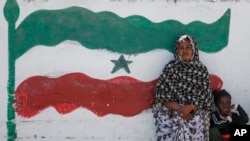President Muse Bihi Abdi's term of office has been extended to 2024 by the Guurti, a non-elected gathering of elders drawn from traditional tribes that is also the upper house of parliament.
The Guurti announced on October 1 drew opposition parties' warning that they were against the move, and fears of bloodshed have risen.
"The mandate of the current president Bihi has ended today after he had failed to hold an election," the two biggest opposition parties said in a statement issued late Sunday.
"Starting from today, we don't recognize the legitimacy of the president and his government," it said.
Elections should have taken place on Sunday, a month before Bihi was due to leave office, but were postponed by Somaliland's electoral commission in September.
The two parties, Waddani and the Justice and Welfare Party (UCID), said they stood by unity and democracy and urged supporters to show "restraint and calm."
On September 24, Somaliland's electoral body said the November 13 presidential ballot could not take place on schedule for "technical and financial reasons".
It did not indicate a potential new date, saying only that there would be "a nine-month delay from October 1, 2022."
Somaliland is a former British protectorate that declared independence from Somalia in 1991.
The move has not been recognised by the international community, and the Horn of Africa region of some 4.5 million people is poor and isolated.
On Thursday, the International Crisis Group (ICG) think tank urged Somaliland's international partners to play a more active role to resolve the political crisis.
They should "push its political elites to chart a consensus path forward, offer to mediate if they fail and volunteer to serve as guarantors for whatever resolution emerges," the ICG said.
